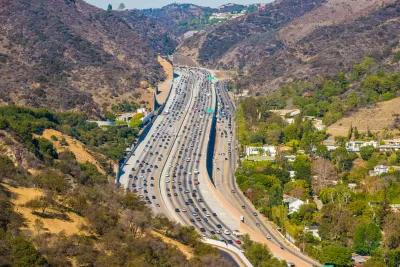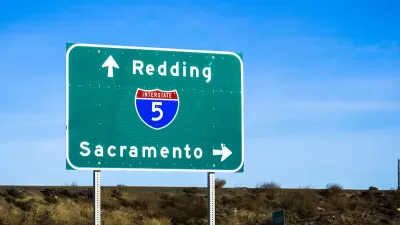If California wants to meet its climate goals, the state must stop funding its myriad road construction and expansion projects.

A new report calls on California to rethink its “traffic-creating, pave-the-earth approach to transportation,” highlighting the environmental and public health impacts of rampant freeway construction.
According to an article by Melanie Curry in Streetsblog California, despite the state’s efforts to support clean air and water policies, the inertia of the status quo and a fear of change “has led to focusing on difficult but politically plausible solutions like electric vehicles, cleaning up the electricity sector, and calling for low-carbon fuels.”
For the authors of the report from NextGen, those efforts are in part a distraction from lower-hanging, but more politically challenging, fruit: “As long as California keeps expanding highways to accommodate driving, all the other efforts - to increase EVs, to produce clean energy, to add bike lanes - will have been a waste of time.”
The report states, “Indeed, if California continues to expand highway capacity, the resulting increase in VMT will overwhelmingly cancel out the climate benefits of mode shift generated through concurrent transit improvements.”
The report suggests some solutions for creating a “smarter and better transportation system” that creates more jobs and improves quality of life and safety. Namely, “California needs to: align transportation funding with climate goals (as called for by the state Climate Action Plan for Transportation Investment, CAPTI); bring transparency and accountability to the project selection process (as attempted with several bills in the past few years that so far have failed to make it through), and improve oversight and rigor in agency analyses of project impacts (also the subject of numerous bills).”
The report also recommends limiting the use of “statements of overriding considerations,” a tool often employed by Caltrans and other transportation agencies to push road expansion projects through at the expense of housing or green space.
FULL STORY: California Has to Stop Building Freeways. Now.

Maui's Vacation Rental Debate Turns Ugly
Verbal attacks, misinformation campaigns and fistfights plague a high-stakes debate to convert thousands of vacation rentals into long-term housing.

Planetizen Federal Action Tracker
A weekly monitor of how Trump’s orders and actions are impacting planners and planning in America.

In Urban Planning, AI Prompting Could be the New Design Thinking
Creativity has long been key to great urban design. What if we see AI as our new creative partner?

King County Supportive Housing Program Offers Hope for Unhoused Residents
The county is taking a ‘Housing First’ approach that prioritizes getting people into housing, then offering wraparound supportive services.

Researchers Use AI to Get Clearer Picture of US Housing
Analysts are using artificial intelligence to supercharge their research by allowing them to comb through data faster. Though these AI tools can be error prone, they save time and housing researchers are optimistic about the future.

Making Shared Micromobility More Inclusive
Cities and shared mobility system operators can do more to include people with disabilities in planning and operations, per a new report.
Urban Design for Planners 1: Software Tools
This six-course series explores essential urban design concepts using open source software and equips planners with the tools they need to participate fully in the urban design process.
Planning for Universal Design
Learn the tools for implementing Universal Design in planning regulations.
planning NEXT
Appalachian Highlands Housing Partners
Mpact (founded as Rail~Volution)
City of Camden Redevelopment Agency
City of Astoria
City of Portland
City of Laramie





























